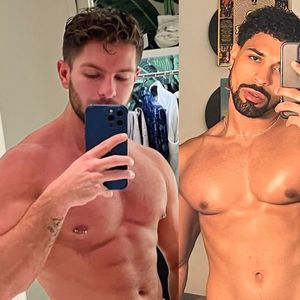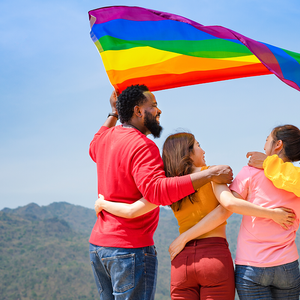CONTACTStaffCAREER OPPORTUNITIESADVERTISE WITH USPRIVACY POLICYPRIVACY PREFERENCESTERMS OF USELEGAL NOTICE
© 2024 Pride Publishing Inc.
All Rights reserved
All Rights reserved
By continuing to use our site, you agree to our Private Policy and Terms of Use.
The Alaska supreme court heard arguments Monday regarding whether the state and the municipality of Anchorage must extend benefits to the partners of gay and lesbian employees. In a case that dates back to 1999, lawyers for the American Civil Liberties Union, the municipality, and the state took about an hour to present their positions. The court gave no indication when it would rule. Plaintiffs argue that the state's ban on marriage between people of the same sex makes it impossible for gay men and lesbians to obtain the same benefits for their partners as married employees. "The practical result is, if you can't get married, you can't qualify for those benefits," said ACLU attorney Allison Mendel. "It that fair?" Mendel said the reasons presented by the state for restricting benefits such as health insurance, retirement funds, and pensions to spouses only are "pretty lousy." The case arose after nine gay and lesbian employees filed suit with the ACLU shortly after Alaska voters passed a constitutional amendment banning state recognition of marriages between members of the same sex. Last November, superior court judge Stephanie Joannides ruled that the state and municipality of Anchorage do not have to extend benefits to gay and lesbian couples. She found that gay couples fall into the same legal category as unmarried heterosexual couples and therefore are not entitled to benefits. That theme was picked up on by assistant attorney general John Gaguine, who said far more opposite-sex couples who are not married do not receive benefits than gay couples. "This does not involve discrimination," Gaguine said. Gaguine said the state has several compelling reasons for drawing the line at marriage, including cost savings, ease of administration, and the state's goal of promoting marriage. The last argument is particularly bogus, Mendel said. "Marriage promotion? They can't marry. If you can't get married, how does it promote marriage?" she asked. Chief Justice Dana Fabe asked how, if such partners were not married, the state could protect itself from being hoodwinked by people who just want benefits. Ken Choe, an attorney for the ACLU's Lesbian and Gay Rights Project, said the University of Alaska has demonstrated that such a benefits program can be implemented. Mendel said the state's argument that it's too difficult to administer a similar program is weak. Many towns and municipalities across the country are doing it, she pointed out. Plaintiff Dan Carter, 55, said the marriage requirement is unfair to his longtime partner, 71-year-old Al Incontro. Incontro, who received health insurance as an employee of IBM, could have used extra insurance two decades ago when he needed heart surgery, Carter said. Now that the two are getting older, each would like to see the other get his pension benefits, depending on who dies first. "It is the issue of fairness, equal pay for equal work," said Carter, who retired in May as a marketing manager for the Anchorage bus service.
Want more breaking equality news & trending entertainment stories?
Check out our NEW 24/7 streaming service: the Advocate Channel!
Download the Advocate Channel App for your mobile phone and your favorite streaming device!
From our Sponsors
Most Popular
Here Are Our 2024 Election Predictions. Will They Come True?
November 07 2023 1:46 PM
Meet all 37 of the queer women in this season's WNBA
April 17 2024 11:24 AM
17 Celebs Who Are Out & Proud of Their Trans & Nonbinary Kids
November 30 2023 10:41 AM
Here Are the 15 Most LGBTQ-Friendly Cities in the U.S.
November 01 2023 5:09 PM
Which State Is the Queerest? These Are the States With the Most LGBTQ+ People
December 11 2023 10:00 AM
These 27 Senate Hearing Room Gay Sex Jokes Are Truly Exquisite
December 17 2023 3:33 PM
10 Cheeky and Homoerotic Photos From Bob Mizer's Nude Films
November 18 2023 10:05 PM
42 Flaming Hot Photos From 2024's Australian Firefighters Calendar
November 10 2023 6:08 PM
These Are the 5 States With the Smallest Percentage of LGBTQ+ People
December 13 2023 9:15 AM
Here are the 15 gayest travel destinations in the world: report
March 26 2024 9:23 AM
Watch Now: Advocate Channel
Trending Stories & News
For more news and videos on advocatechannel.com, click here.
Trending Stories & News
For more news and videos on advocatechannel.com, click here.
Latest Stories
Black trans woman África Parrilla García shot to death in Puerto Rico
April 18 2024 4:55 PM
Marjorie Taylor Greene has sunk so low even Fox News can't stand her anymore
April 18 2024 4:04 PM
Single lesbians are avoided by straight women, but not straight men. Here's why.
April 18 2024 3:18 PM
The LGBTQ+ movie fan's guide to the 2024 TCM Classic Film Festival
April 18 2024 2:44 PM
The federal government failed on mpox. Ritchie Torres's new bill addresses that (exclusive)
April 18 2024 1:21 PM
True
In the face of tweets and turmoil, why I left the South as a medical student
April 18 2024 7:30 AM
Trans man Tee Arnold shot to death in Florida
April 17 2024 4:41 PM
Can scientific research on the causes of homosexuality be used against LGBTQ+ people?
April 17 2024 4:02 PM
















































































